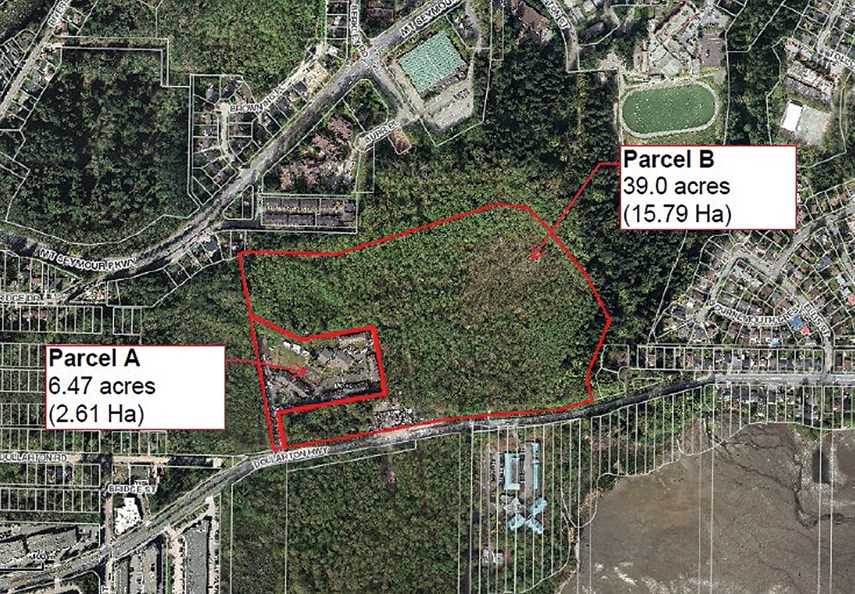North Vancouver’s Tsleil-Waututh Nation is looking to add to their reserve 45 acres of land in the Maplewood area.
The 600-member nation has formally applied to Crown-Indigenous Relations and Northern Affairs Canada to take on the land that it had been seeking to redevelop into the now-stalled Maplewood Innovation District. The property at 2420 Dollarton Hwy. is currently owned by a 50/50 partnership of Darwin Construction and the Tsleil-Waututh Nation.
The Addition to Reserve application is intended to move the community toward “self-sufficiency and sovereignty,” according to Chief Leah George Wilson.
“We strive to preserve the Tsleil-Waututh values in our land and business development activities,” Wilson stated in a release.
After initially proposing 900 units of housing and 1.4 million square feet of tech-centric business space on the former gravel quarry site, Darwin advanced a more modest development this year, pitching a combined 424,713 square feet of light industrial and office space as well as 250 to 275 rental housing units. In a split vote in May, district council deferred voting on the proposal until 2020, to allow for a review of the official community plan.
Archeological evidence shows the Tsleil-Waututh have occupied the land for almost 4,000 years and oral histories date back 10,000 years, according to the band. Before colonization, the land was a Tsleil-Waututh village site known as Squaw-uck, which they used for harvesting berries and medicinal plants, hunting deer and other game, trapping, collecting firewood and harvesting salmon from Ah-wal-tum/McCartney Creek. If their application is successful, it will once again be used to help the band sustain itself, albeit in a more modern fashion.
“The return of this ancestral land to the Tsleil-Waututh Nation will help the nation move towards economic prosperity for present and future generations, and create more opportunities for the nation to continue to build meaningful relationships with our neighbouring communities,” George Wilson stated in the release.
The land is made up of two adjoined parcels, 6.5 acres and 39 acres in size. The larger parcel was last assessed at $47,382,000. No info was available on the smaller lot’s assessment.
Canada’s Addition to Reserve policy dates back to 1972, although new legislation brought into effect in August streamlines the process for First Nations. In evaluating the application, the federal government must assess any environmental concerns, the qualms of municipal and provincial governments, public access, and the cost-effectiveness of the proposal. The whole process is expected to last until sometime in 2021.
District Mayor Mike Little said he learned about the proposal directly from George Wilson shortly before it was announced.
“Obviously, it’s a major decision that has to be made. I’m supportive of reconciliation, and I think you’ll find our whole council is supportive of meaningful reconciliation. And we’ve known for a long time that that was going to mean the transfer of administration of land,” he said.
Although district council will have lost any right to determine how the land is used and any tax revenue it generates, the project will have to be plugged into district utilities, which will require the two sides to negotiate a servicing agreement, Little said.
Little said he expects the district will have a lot of time to sit down with the band’s leadership “as neighbours and partners.”
Little said his council wasn’t opposed to redevelopment of the land, although they likely would have preferred something more modest than what the Darwin/Tsleil-Waututh partnership was proposing, and spread out over a longer time.
“We had anticipated that there would be some changes on the site, but we wanted to have meaningful consideration of the environmental impact of changing the use on that site and redeveloping it,” he said. “Which is why we deferred it. We did not reject it.”



